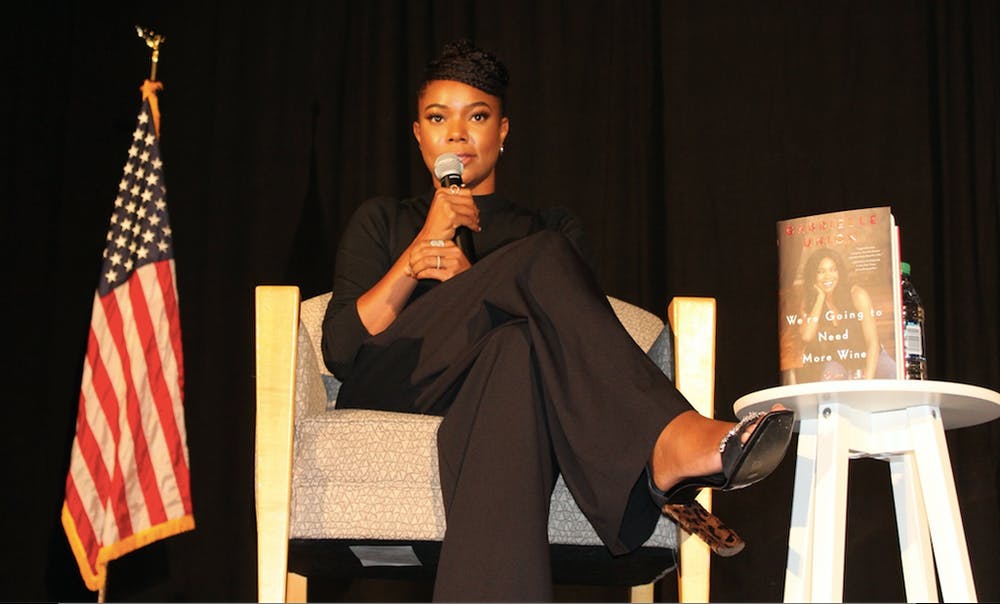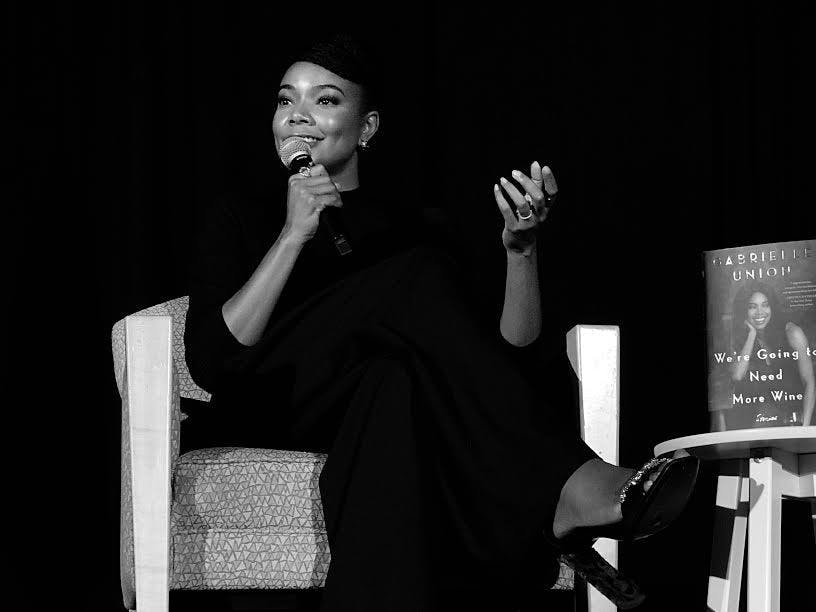BY: LAUREN LUMPKIN
Content warning: racial slurs, sexual assault
Listen to the full interview.
"Do Buckwheat," she said.
When Gabrielle Union was in second grade, her family moved from Omaha, Nebraska to Pleasanton, California. She remembers going to sleepovers in the predominately white town, and not wanting to wrap her hair in a scarf in front of her friends. When she woke up, her hair a mess, her friends would ask her to impersonate Buckwheat, the black character from "The Little Rascals," known for his wild hair.
"And so I did Buckwheat," Union told the Bender Arena audience on Saturday.
Union's friends in high school made it clear that she was the safe, acceptable type of black girl – something that she has spent much of her career wrestling with. "No, no, no those are niggers over there," her friends would say about black people in other parts of California like Oakland, "you're like cool black people."

Photo by Janell Roberts
At 19-years-old, Union was brutally attacked and raped outside of her part-time job at Payless shoe store. For the past 25 years, she has battled feelings of worthlessness and the fear of being seen as "defective" for being a sexual assault survivor.
Union has poured all of these experiences and more into her new book "We're Going to Need More Wine."
"I'm going to be 45 [years old] in two weeks and I'm just now feeling like my words have value," she said to Saturday's crowd. But before Union took the stage, The Blackprint got a chance to sit down with the award-winning actress and new author to discuss her natural hair journey, being a black woman in the entertainment industry, her upbringing and the challenges that come with raising black boys.
On her hair journey and why she believes black hair is constantly under attack
"White supremacy. My second answer would be white supremacy and my third answer would be white supremacy. But we also need to erase this stigma about what constitutes good hair and what constitutes a good person on their hair journey. Your character has nothing to do with your hair journey, so if you have embraced a natural hair journey – amazing. That is an amazing choice. If you're rocking a wig or a weave down to the floor – amazing. That is your choice and I support you. Neither says anything about your character and what you would do in the face of adversity.
My journey towards natural hair came out of trying to assimilate to a degree that I literally looked nuts, like me and the relaxer did not get along. I kept thinking that the longer I left the relaxer on, the closer I would be to a Eurocentric ideal of beauty. But the longer I left it on, it actually caused lesions. So you know what's not sexy? Lesions. So I ended up looking nuts. And then because of my job, with this relaxed hair, I would weave it up. So braiding relaxed hair puts so much tension and stress on the hair, it actually breaks off. So in between weaves I was left with distressed and damaged hair – also not attractive. So if my whole goal was being more attractive to the male gaze, my plan was ass-backward.
And now that there's a mild shift – I'm not going to say a full shift – in Hollywood toward embracing people with all different types of hair, and hair texture and hairstyles. I'm able to explore more of that with the characters that I'm playing. But it is interesting, I was just speaking at CBS to executives and their employees, and we were talking about what constitutes professional hair in the workplace. I told them a story of doing a film where I had wanted my character to wear braids, and this was a black film. And they were like, ‘Oh [but] we really wanted her to be attractive,' and I was like, ‘Yeah, so um, Senegalese twists is what I'm really looking for.' But had I not been an executive producer on the project, I would still be battling with someone who had a very narrow scope of what a black woman who's attractive, and sophisticated, and classy and professional, what that hairstyle could be."

American University Professor Sybil Williams moderated the conversation with Union
Photo by Janell Roberts
On working in predominantly white spaces and dealing with racism and sexism
"I found my group. I found my tribe of other women of color in entertainment, in front of and behind the camera. We have a lot of inappropriate and very funny and very brutally honest group chats, where we say all the things that we'd like to say at work without being deemed ‘the angry black executive,' ‘the angry black actor,' ‘the angry black producer.'
To always be othered is exhausting. To always be put in the position of being the Rosa Parks of ‘X' set is exhausting. In this day and age of Google, if you are ignorant at this point, it's willful ignorance. You're making a conscious effort to be ignorant. You knew damn well that was a racist joke, you knew damn well you were sexually harassing your coworker, you knew damn well that you're making people uncomfortable with you homophobic remarks, or your transphobic remarks, or that joke that you told at the expense of a disabled person. And in Hollywood, now that they realize that real inclusion actually makes money, there's a lot of people that are kind of running back on their heels because they're terrible piss-poor behavior, and their sexism, and their homophobia, and their racism and every other ‘ism' you can think of is now being openly challenged. And they're being checked and forced to be accountable. And right now, we're seeing the accountably includes loss of job and employment for the willful ignorance that they openly practice.
But it's isolating. It at times can be terrifying, knowing that there's people that I started up with in the mid-90s that did voice complaints about racism on set, or throughout Hollywood sexism, sexual harassment, sexual assault and you literally never heard from them again. So retaliation is real. Isolation is real, ostracization is real. And so it's scary."

Photo by Janell Roberts
On her Catholic upbringing and what her mom taught her about compassion
"My mom is super catholic. She legit believes that divorce equals eternal damnation. So she's just sort of like waiting for her ticket to eternal damnation but just trying to do the best she can in the meantime. But she decided very early on that she wanted her girls to have a world perspective and not a town perspective. And she said, ‘I didn't want my faith to limit who you guys could be and who you could know and where you could go.' Which now that I'm an adult, I'm like, that's very unselfish. My mom at, 60 [years old], adopted the first of three kids. She's now 70 with a 10-year-old, a 9-year-old and a 6-year-old that she's raising by herself because she sees the dire need for families. And she recognizes that families are going to come in all shapes and sizes and forms, and no matter how your family comes together, that it's real and valid. She has so many years in social work that she felt like, ‘Okay, even though I'm a senior, and probably might not have the energy that other younger parents might have and I had a husband the first time around, but dammit I'm gonna give these kids a home and do my best.'
But my mom is so ‘glass half-full.' I mean that glass could have cobwebs and be bone dry, but my mom is like, ‘It's spilling over.' But for someone to have that attitude and has literally seen the worst of humanity, and how the worst of humanity has preyed on and abused and violated the smallest of children with impunity – it fascinates me. We obviously move through the world a little differently. I'm a lot angrier than my mother, but that upbringing does allow me to have a lot more compassion and empathy than I probably would have had had I had a different mom. I mean she took us to our first gay pride parade at 8 years old because she didn't want – my mom loves the word ignoramuses – ‘I didn't want my daughters to be ignoramuses.'"
On how Trayvon Martin's death changed the way she parented
"Any time there's state-sanctioned violence it's alarming. When you're raising teenage boys in the state of Florida, that is an open carry state and a ‘Stand Your Ground' state, and you know you watch the news, and you know that if our children are not literally standing by us with a sign that says ‘I am the children of Dwyane Wade and Gabrielle Union,' they're just black boys. And when you've seen blackness be weaponized, and demonized and deemed inherently threatening from birth – it is terrifying that we live in a state and a country that you can kill us and get away with it, and all you have to say was, ‘I was afraid.'
So when you look at Trayvon Martin, and he's a child with some Skittles and an iced tea, with a hoodie on – that our boys wear. Our kids like Skittles. Not really much of tea drinkers, but they'll have something else, who have the audacity to walk in the space that they live with the assumption that they're not going to be surveilled, and harassed and put in a position to defend themselves from a psychotic vigilante, but what was he avenging? Black bodies in white spaces?
Now we're in Cleveland, our kids just got to Cleveland to watch dad play for the Cavs. Cleveland, open carry state. There was a child named Tamir Rice, who was playing with a toy gun, but it's an open carry state so even if it was a real gun, it's his right. But in less than two seconds, they deemed his blackness threatening and in need of putting down like an animal. Somebody's child. And I have to somehow raise children with confidence in themselves and pride in themselves, while at the same time preaching not just respect for our men and women in law enforcement, but subservience. And even that might not save you."
"We're Going to Need More Wine" can be found at Barnes & Noble and Amazon.
This interview has been edited and condensed for clarity.


